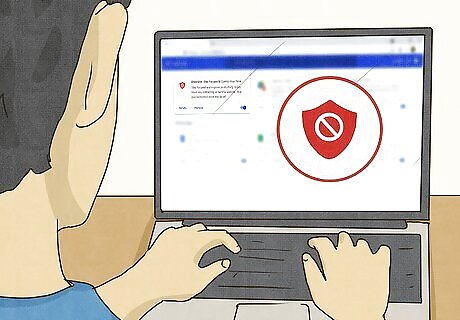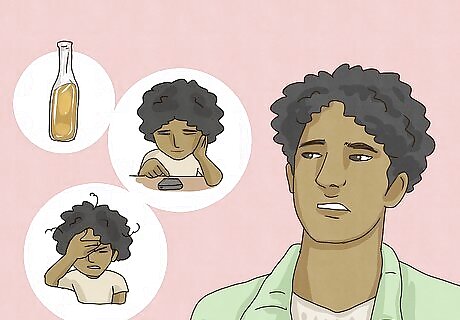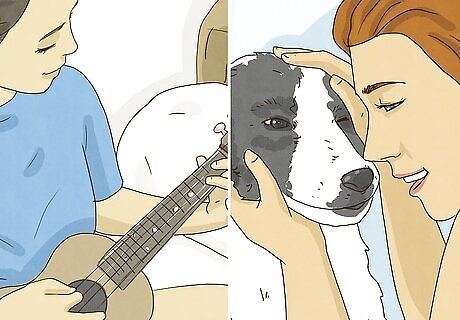
views
Set boundaries for yourself.

Avoiding temptations can help you manage your desires. For instance, if you’re tempted to look at porn whenever you’re on your computer, download an app or browser extension to block tempting websites. Or, if you’re struggling with sexual feelings about a particular person, limit how much time you spend with them if possible. Making your activities more public can make it harder to give in to sexual urges. For instance, try using your computer in a public place, like a park bench or coffee shop, instead of while you’re alone in your room. If you go out to a bar or the beach, bring a friend who can distract you and keep you busy so you’re not scoping people out. If you're lusting over a specific person, avoid checking their social media or doing things to get their attention.
Make a list of reasons to resist.

Clearly defining your values can strengthen your resolve. When you set a goal for yourself—whether it’s eating healthier or getting better at resisting sexual temptation—it helps to have a clear idea of why you’re doing it. Write down the main reasons why overcoming lust is important to you, and review it any time you feel your resolve starting to slip. For example, your reasons might include things like: “I want to wait on having sex until I’m married, because sexual intimacy is sacred and special to me.” “I’m trying to resist temptation because I want to be faithful to my spouse.” “Self-discipline is an important part of my spiritual beliefs. I want to overcome lustful thoughts to improve my relationship with my higher power.” “I don’t want my unwanted sexual urges and behaviors to damage my relationships or cause problems in my professional life.”
Identify your triggers.

Understanding your desires makes it easier to control them. Next time you experience feelings of lust, think about what’s going on. For example, do you get more unwanted sexual thoughts when you’re stressed out or bored? What about when you’re around certain people or in specific places (like at the beach or in a bar)? Write down a list of things that seem to trigger those unwanted thoughts and feelings, and jot down some ideas about how to deal with those triggers. For instance, if you realize that those lustful thoughts show up more when you’re bored, look for ways to keep your mind busy. Try listening to music or a fun podcast while you’re doing boring tasks, like folding laundry. You might realize that you’ve been using sexual thoughts or behaviors to cope with stress. Set an intention to find new coping methods and form healthier habits.
Find healthy ways to keep yourself busy.

Blow off steam and distract yourself with fun hobbies and activities. Next time you start dwelling on sexual thoughts, go for a run or call up a friend to chat. You could also do something creative, like painting, playing an instrument, or cooking a nice meal. This will help take your mind off of your unwanted desires. Focus on activities that help you feel good about yourself instead of focusing on the person you're lusting over.
Rekindle your romance with your significant other.

Strengthening your relationship may reduce temptation. If you’re married or in a committed relationship, remind yourself of what you find attractive about your partner. Make an effort to spend quality time with them. Go out of your way to nurture love, affection, and physical intimacy in the relationship. This will help you refocus your thoughts and desires on your SO instead of other people. If you’re not sure how to get the spark going again, here are a few things to try: Schedule a little time each day—even if it’s just 10-15 minutes here and there—to talk about fun things. Make it a rule not to discuss work, school, kids, or any other day-to-day business during this special time! Make a list of the top 10 things you love most about your SO, or of your favorite memories together. Do something new together, like going on a weekend trip, taking a dance class, or checking out a new restaurant in your neighborhood. Practice physical intimacy. Even if you’re not having sex, there are other ways to show physical affection, such as hugging, kissing, or giving each other back rubs.
Try relaxation techniques to help you unwind.

If stress is a trigger for sexual obsessions, relaxing activities can help. If you feel yourself getting tense, listen to peaceful music, do light stretches, or try a little yoga. Taking a shower or going for a walk could also help. If you get distracted trying to unwind on your own, try signing up for a class (like an online Tai Chi course) or doing something relaxing with a friend.
Join a self-help group.

Others going through the same thing can be a great resource. Ask your doctor or a therapist to recommend a group, or look for support groups online. Being in a group can help you feel less alone and make your unwanted sexual desires feel less upsetting. Other members of the group can also share strategies and advice to help you cope. If you’re still social distancing or don’t feel comfortable meeting in person, look for a group that meets online. You might need to try different groups before you find one that feels right to you. Self-help groups take many forms. Some are faith-based, while others take a more psychological approach. Think about which method will be most helpful to you, and search for groups that meet your needs.
Pray for guidance if you’re religious or spiritual.

Prayer can help you find peace and clarity. Many people of faith turn to prayer when they’re struggling with issues like lust and temptation. If you believe in a higher power, take a moment each day to privately commune with them and ask for guidance. For instance, some Christians pray on specific Bible verses that help them refocus their thoughts on their commitment to God (such as Psalm 19:14). Studies show that prayer brings greater peace and well-being when you keep it positive and focus on talking to your higher power instead of blaming yourself and dwelling on your failings. For example, instead of saying something like, “God, I failed and gave in to temptation again,” try something like, “God, I’m so grateful to be on this path to becoming the person I want to be. Can you help me through the challenge of overcoming these tempting thoughts?”
Get advice from a spiritual or religious leader.

They can offer faith-based guidance. If you’re religious or spiritual, you might find it helpful to get the perspective of someone who shares your beliefs. Ask to meet with a trusted clergy member or find a counselor who offers faith-based therapy. Explain that you are experiencing lustful thoughts and ask if they can offer strategies to deal with them. This can feel embarrassing, but remember that there’s a good chance they have struggled with similar issues themselves! It’s also their job to help people work through issues related to their faith, whatever those might be.
Practice mindful meditation

Look up guided meditations online or sign up for a class. Studies show that mindfulness can help people with all kinds of sexual challenges, including feelings of shame or discomfort related to sex. It may help your sexual urges feel less overwhelming and stressful when they happen. To practice a simple mindful meditation: Sit or lie down in a quiet, comfortable spot. Close your eyes if you like. Take a few slow, deep breaths. Focus on the feeling of your belly rising and falling as you breathe. Focus on other physical sensations, like feelings of tension in your body or things that you can sense in your environment (like sounds or smells). Sit for a few minutes and be aware of your thoughts. You might notice that you are having sexual thoughts or sensations. Just notice them without trying to analyze or judge them. Gently turn your focus back to your breath for a few minutes before you go back to your regular activities.
Accept that sexual thoughts and feelings are normal.

Trying to push down unwanted thoughts and feelings doesn’t work. This can be really frustrating, but you’ll feel so much better if you acknowledge your thoughts instead of fighting them! Instead of ignoring them or trying to force them out of your mind, just notice them and let them sit there without judgment. Your mind will eventually wander to something else. It can be helpful to label these thoughts and feelings as “unwanted” or “intrusive.” Don’t try to pick them apart or figure out what they mean—just calmly remind yourself that they’re not wanted. This doesn’t mean that your unwanted sexual thoughts and feelings will go away forever. In fact, expect that they will come back. Just practice being more accepting of the thoughts when they come. Nobody can completely control their thoughts and feelings. Remind yourself that what’s going on in your brain and body isn’t your fault and doesn’t make you a “bad” person, even if it feels scary or inappropriate. The important thing is how you act on those thoughts.
Talk to a therapist if you’re feeling overwhelmed.

It’s okay to ask for help if you’re struggling. Reach out to your doctor or look for a therapist with experience treating sexual issues. They can help you manage your feelings and figure out if there are any underlying issues making the problem worse. If you struggle with constant sexual fantasies or urges that cause you a lot of distress or interfere with your day-to-day activities, or if you feel like you can’t control your sexual behaviors, you may be experiencing “compulsive sexual behavior.” If this sounds like you, don’t feel ashamed. It’s not your fault, and you’re not alone. Your doctor or therapist can help! Your therapist may recommend treatments such as cognitive behavioral therapy (CBT) or psychodynamic psychotherapy. Both kinds of therapy help you identify unhealthy thoughts and behavior patterns and build healthier habits.
Ask your doctor about medication if nothing else is working.

Sometimes a chemical imbalance can cause obsessive sexual thoughts. If therapy alone isn’t working, your doctor or therapist might recommend a combination of therapy and medications. This can be especially helpful if your sexual urges are related to another condition, like obsessive-compulsive disorder (OCD) or a hormone imbalance. Some medicines that might help include: Antidepressants and antianxiety medications, which can help reduce obsessive thoughts. Naltrexone, a medication that is used to manage addictive behaviors. Mood stabilizer medications, like those used to treat bipolar disorder. Anti-androgens, which reduce hormones that are associated with sexual behaviors.




















Comments
0 comment